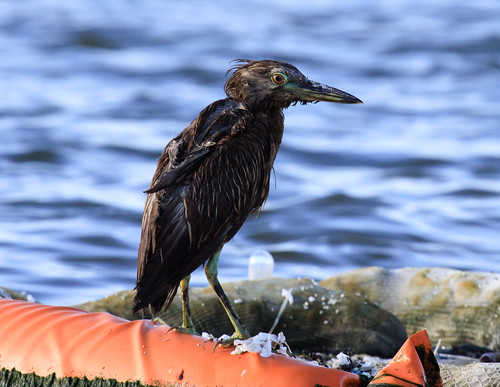 |
| Loving people and birds gives us a lot of incentive to protect their world. |
Every time there’s an oil spill or other environmental disaster, or a president unilaterally decides on a policy that will definitely hurt birds, such as stopping enforcement of important provisions of the Migratory Bird Treaty Act, I get cranky emails from people, like this one I received a few weeks ago from a guy named Joshua, which I quote in its entirety:
Hello, I just wanted to tell you that I listened to the one and only podcast of yours that I will ever listen to. We took our kids to see the sandhill cranes in Nebraska last weekend so I thought I'd try to find some podcasts to get them in the mood and inform them a little before we saw that amazing site. When I listened to your podcast the only thing that you had that I couldn't find in a short blurb in a bird book was your hatred that rang through for Trump. Now, do you think I tuned into a podcast on birds to hear someone talk more politics than birds? I can tune into thousands of political podcasts if I want to hear that. There are not many good podcasts about birds or animals in general and I guess yours in not one either.
It's up to you if you take this as advice or blow it off and chalk it up to a crazy right wing lunatic and go on the way you were. My guess is either I'm the idiot or you wont bring up politics anyway because Trump is out of office now so everything is rainbows and unicorns now.
I wrote back asking which program he had listened to, but he never responded. I wasn’t snarky enough to ask if the bird books he referred to included my own. I know he isn’t a long-time listener or he’d know how furious I was with the Obama administration’s response to the BP oil spill.
Our government—at the local, county, state, and federal levels—has direct effects on birds. And I chose the title of this program for a reason—it’s not “About the Birds,” it’s “FOR the Birds.” I try to include as much sound information about them as possible—when it comes to birds, my agenda is equal parts education and advocacy.
The original Earth Day, in 1970 when I was a college freshman, was focused on how we needed to turn into activists to clean up our air, water, and land. I subscribe to Emily Atkin’s daily Substack newsletter “Heated.” This week she quoted a piece about the original underpinnings of Earth Day that she’d written for The New Republic in 2017:
Earth Day wasn’t supposed to be a corny celebration of green living. Founded in 1970, amid rising awareness of industry’s unchecked pollution of the air and water, its organizers aimed to apply the lessons of civil-right activism to the environmental movement… Earth Day coordinator Denis Hayes “wanted to marry science with social justice activism.”
Activism needs to be both collective and individual. Some of the major organizations focused on bird conservation are extremely effective at what they do, but it takes individuals hammering away, sometimes for years, before those organizations start moving, especially when it involves controversy. Large groups can’t move at all until their bureaucracies settle on an agenda, and they must not displease their donors, their board of directors, or any governmental agencies they partner with on important projects.
Back in the 1980s when I was working to stop construction of a tall, lighted tower along our bird migration pathway, I had to work both as an individual and as president of Duluth Audubon. Even though the tower threatened the very birds that had given our organization its original mission as protector of Hawk Ridge, one person on our board of directors did not want us to get involved at all because of the controversy, and a couple of others weren't as adamant but did not like seeing Duluth Audubon mentioned in news coverage. To avoid alienating them, I had to walk a tightrope when speaking on behalf of Duluth Audubon, while I didn’t need to censor myself when I spoke out as an individual. The company finally did construct a tower there, but scaled down from 300 to 99 feet and with no killing guy wires or lights. I believe that is still the only communications tower battle ever won by the side protecting birds.
After the BP oil spill, when national bird organizations were forced to tone down their criticisms and minimize how bad the spill was during a 5-year moratorium, it was individuals like Shawn Carey of Massachusetts and me, who went there entirely on our own, and Drew Wheelan, who got some support from a non-conservation organization, the American Birding Association, who could actually speak out and let people know how devastating the spill was. The big organizations sat on photos and video and research about the spill for five full years.
I have the great advantage of not being funded for my blog and podcast except by donations from individual readers and listeners. I never have to fear losing my livelihood for speaking out, and I have no directors who can pull the plug on me if I displease a listener. I feel bad when I upset people like Joshua, but I’d feel worse if I had to muzzle myself to avoid ruffling his feathers. As Ella Wheeler Wilcox wrote in 1914, “To sin by silence, when we should protest, Makes cowards out of men.”
